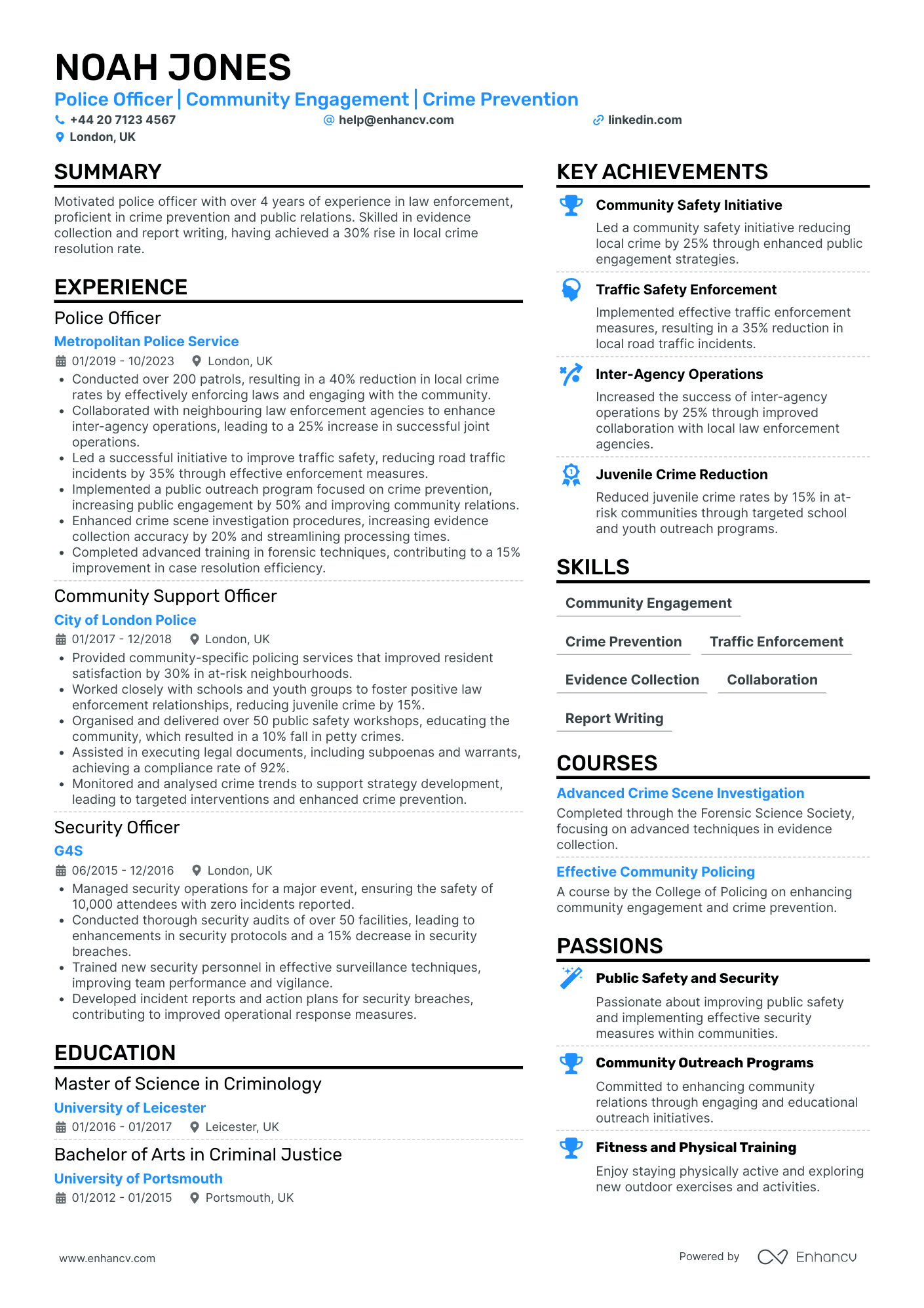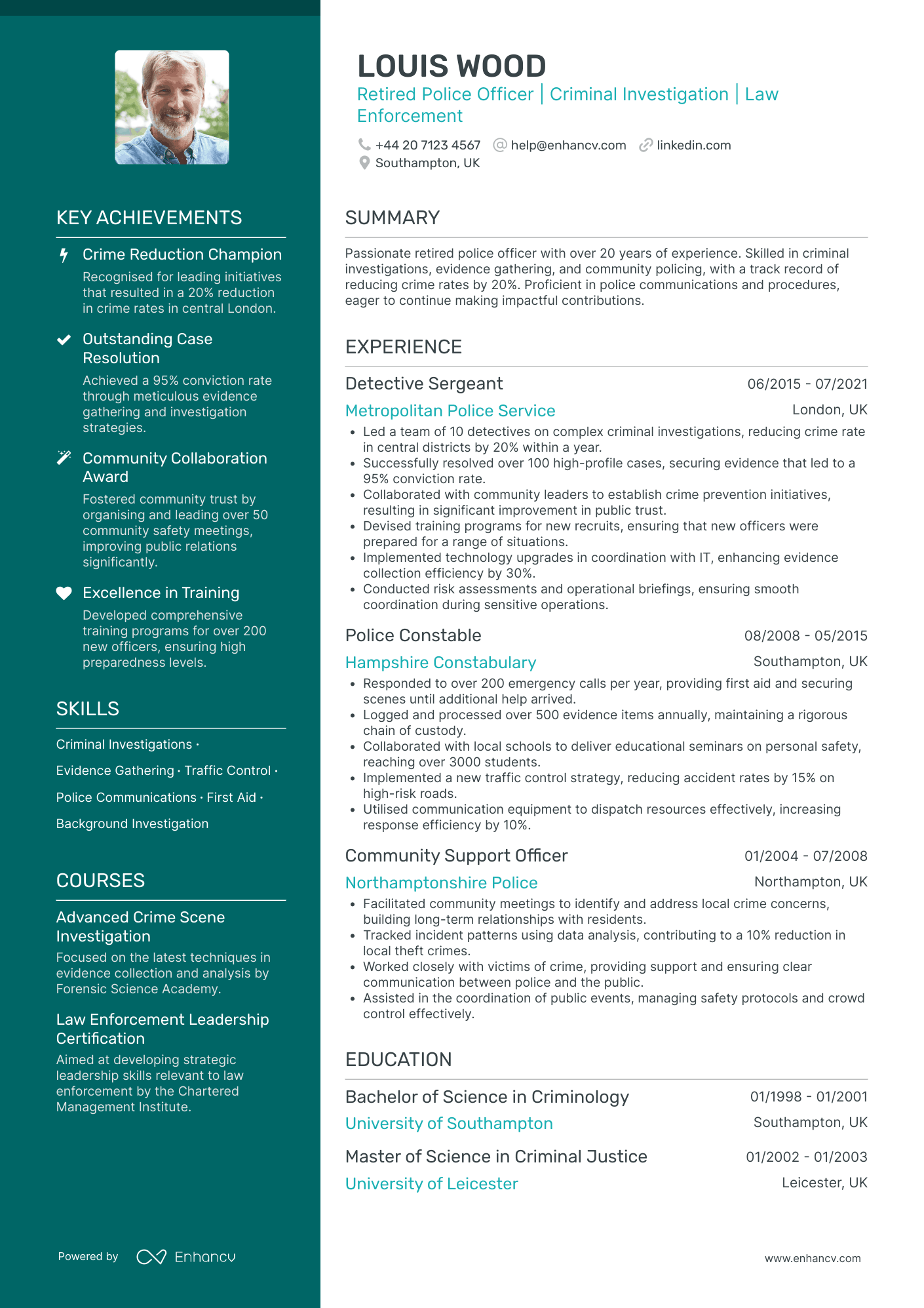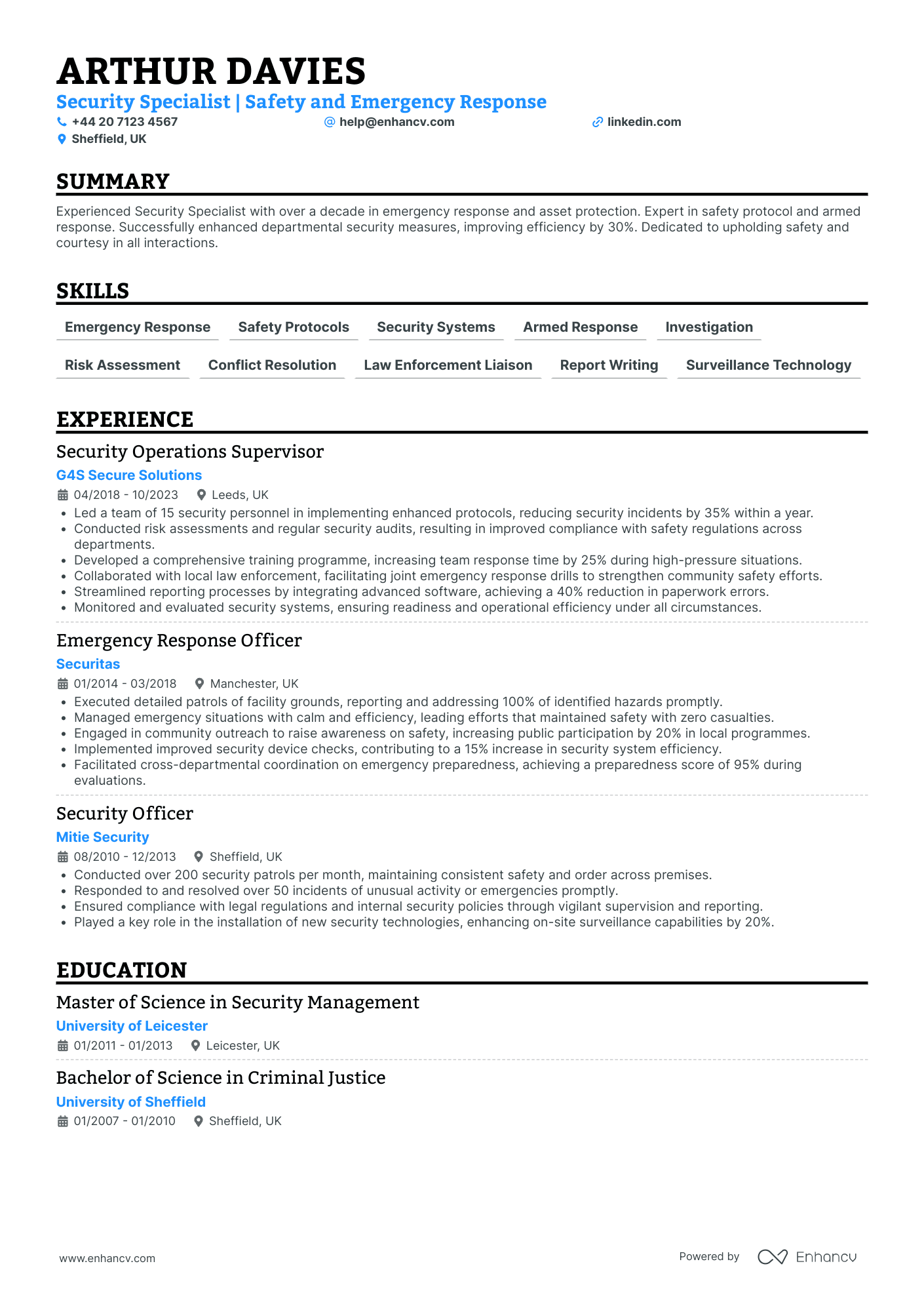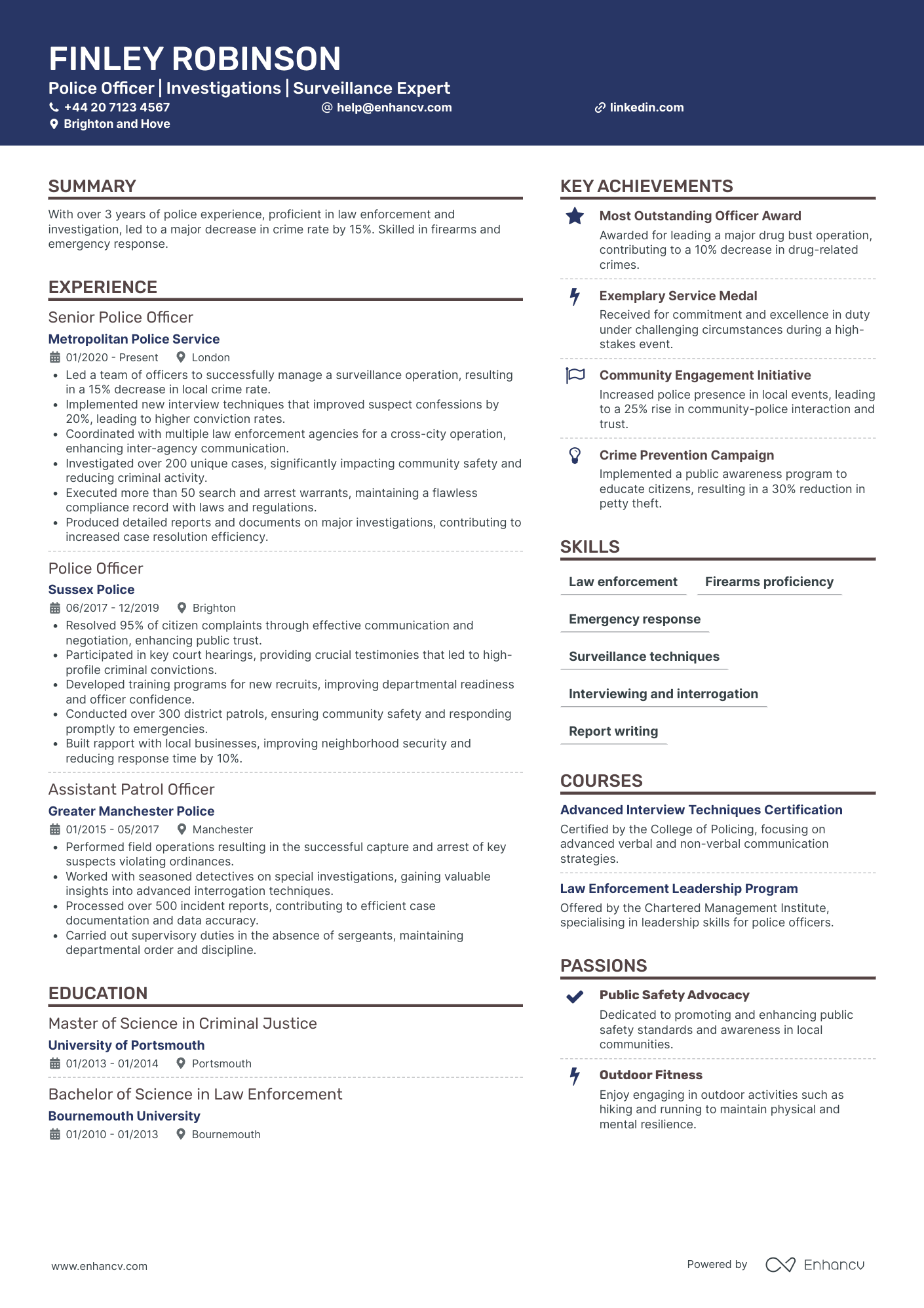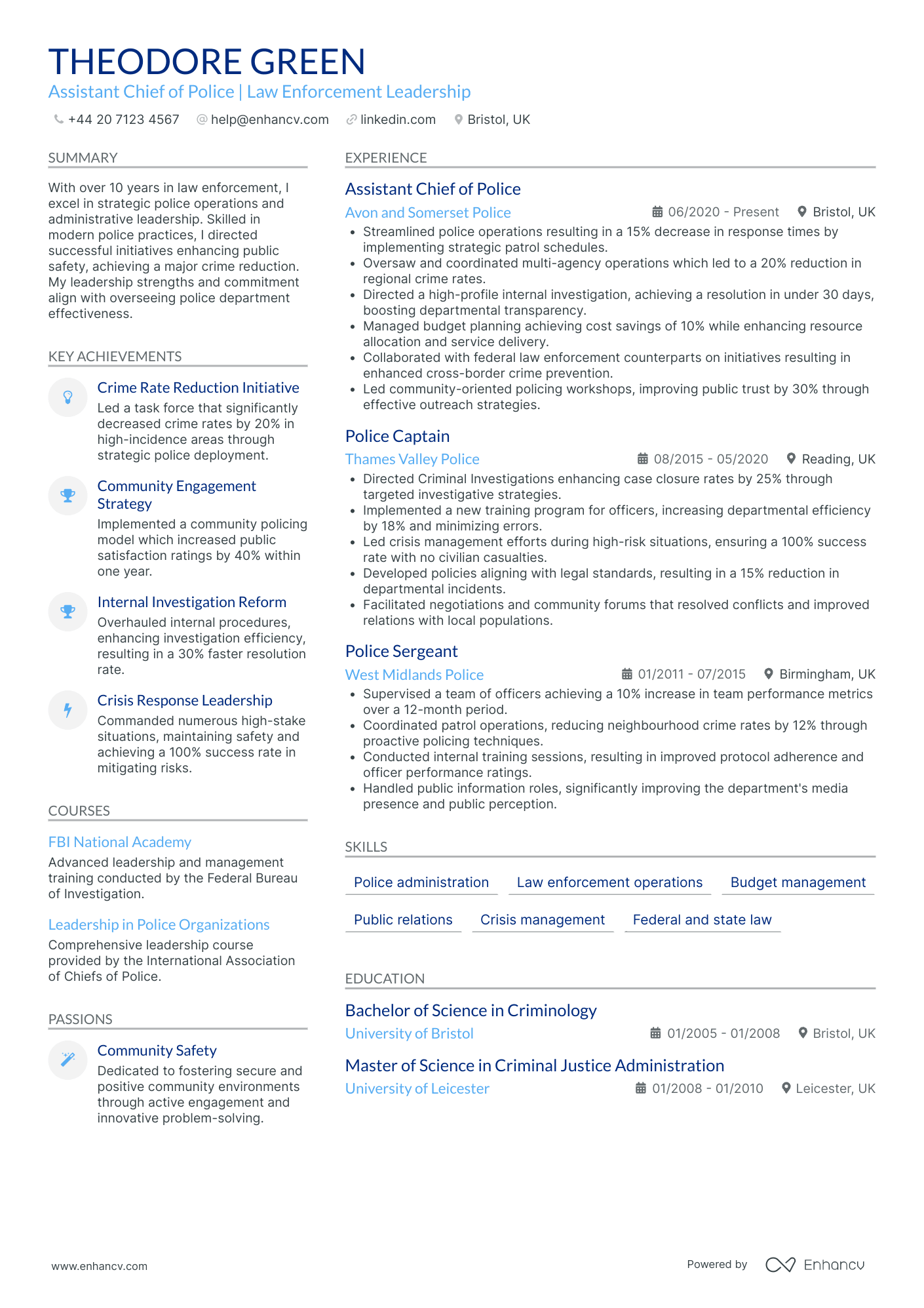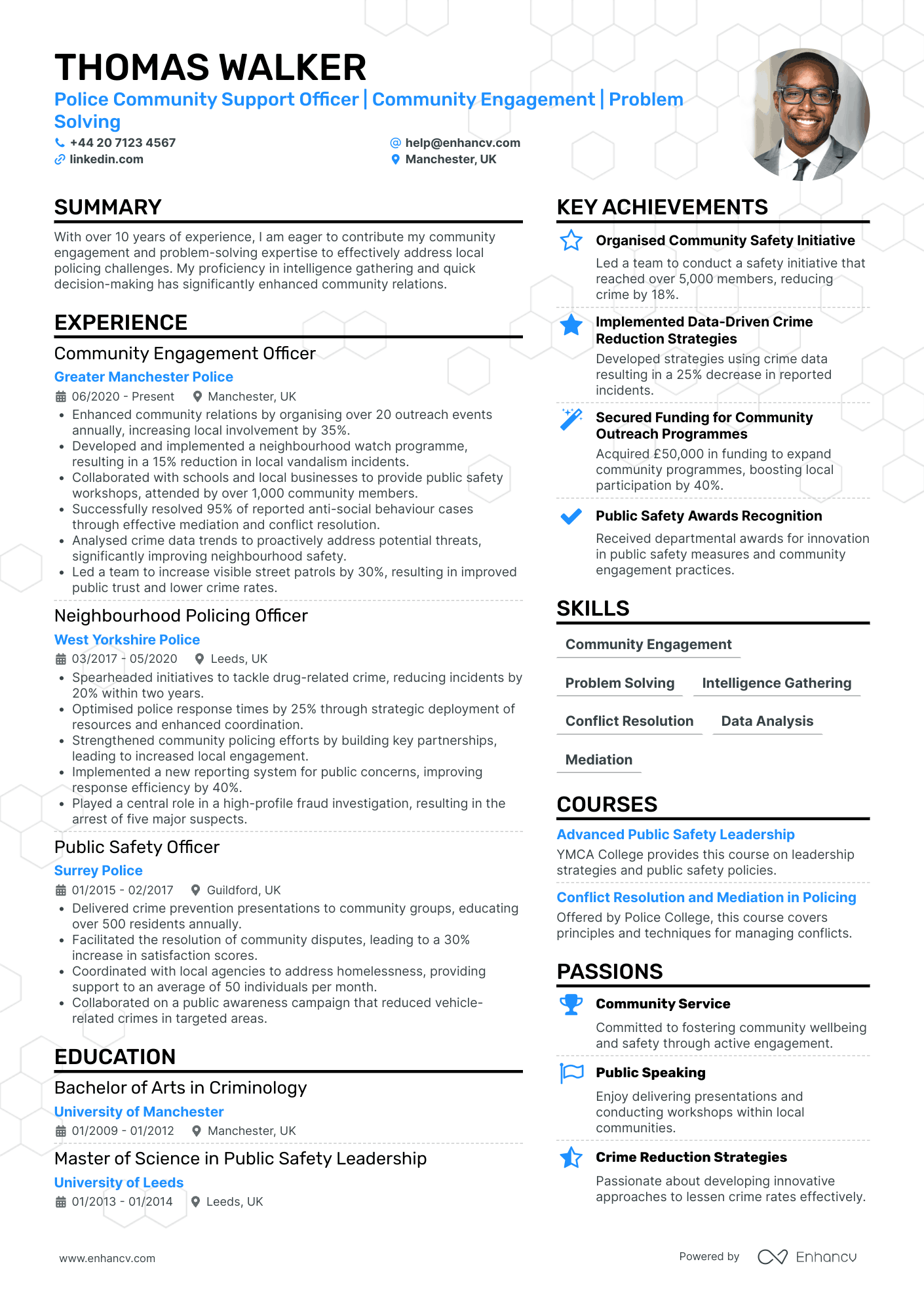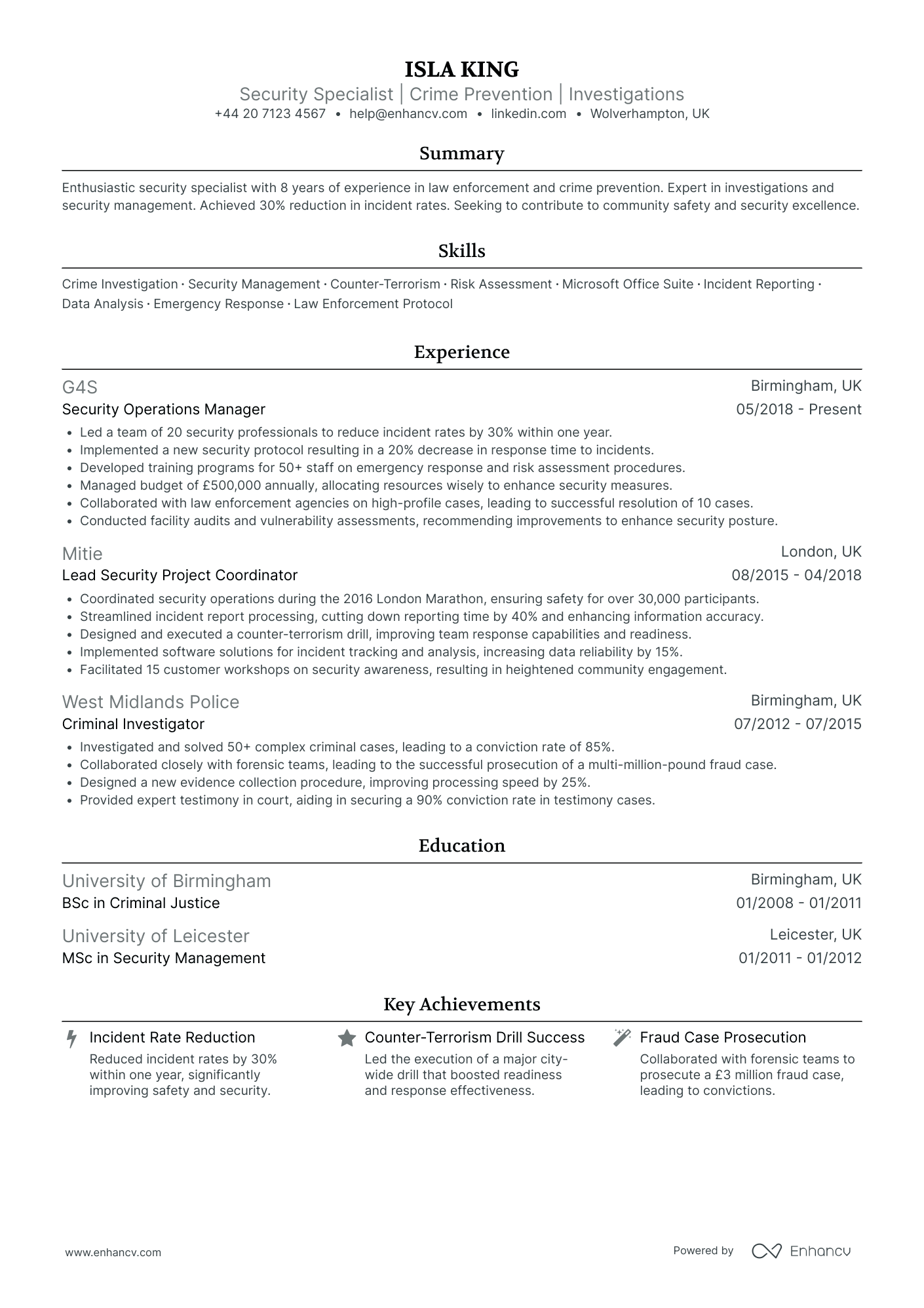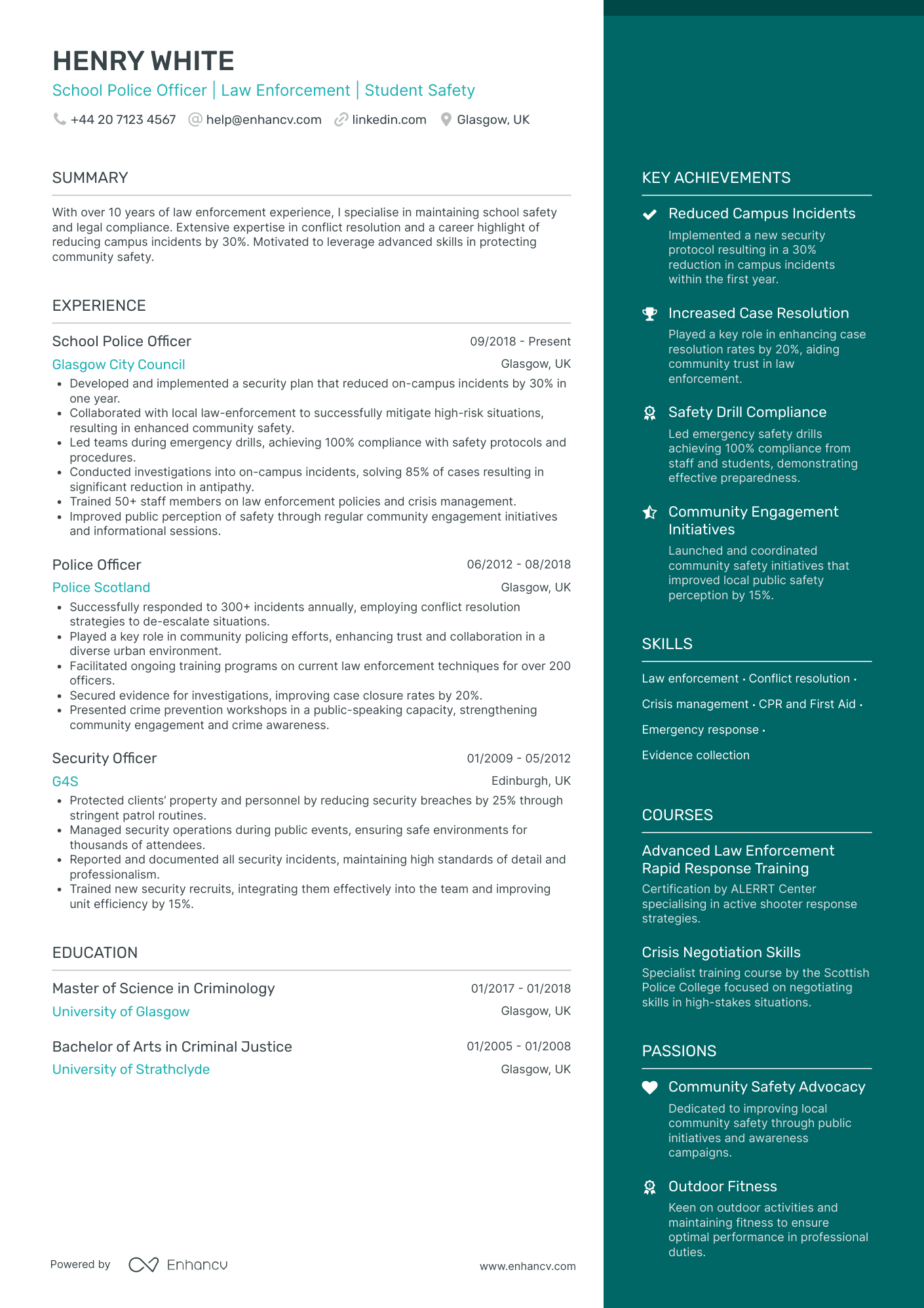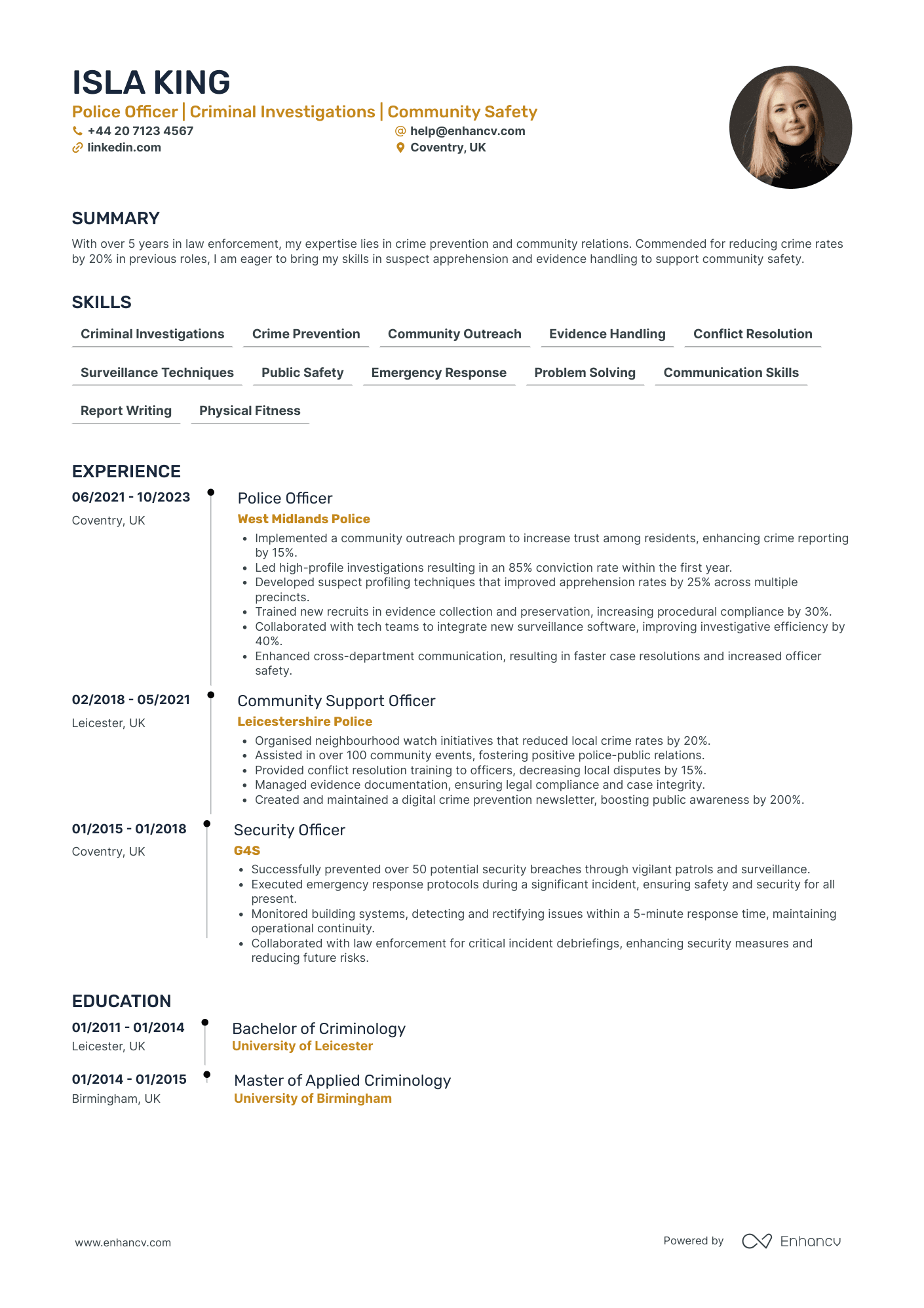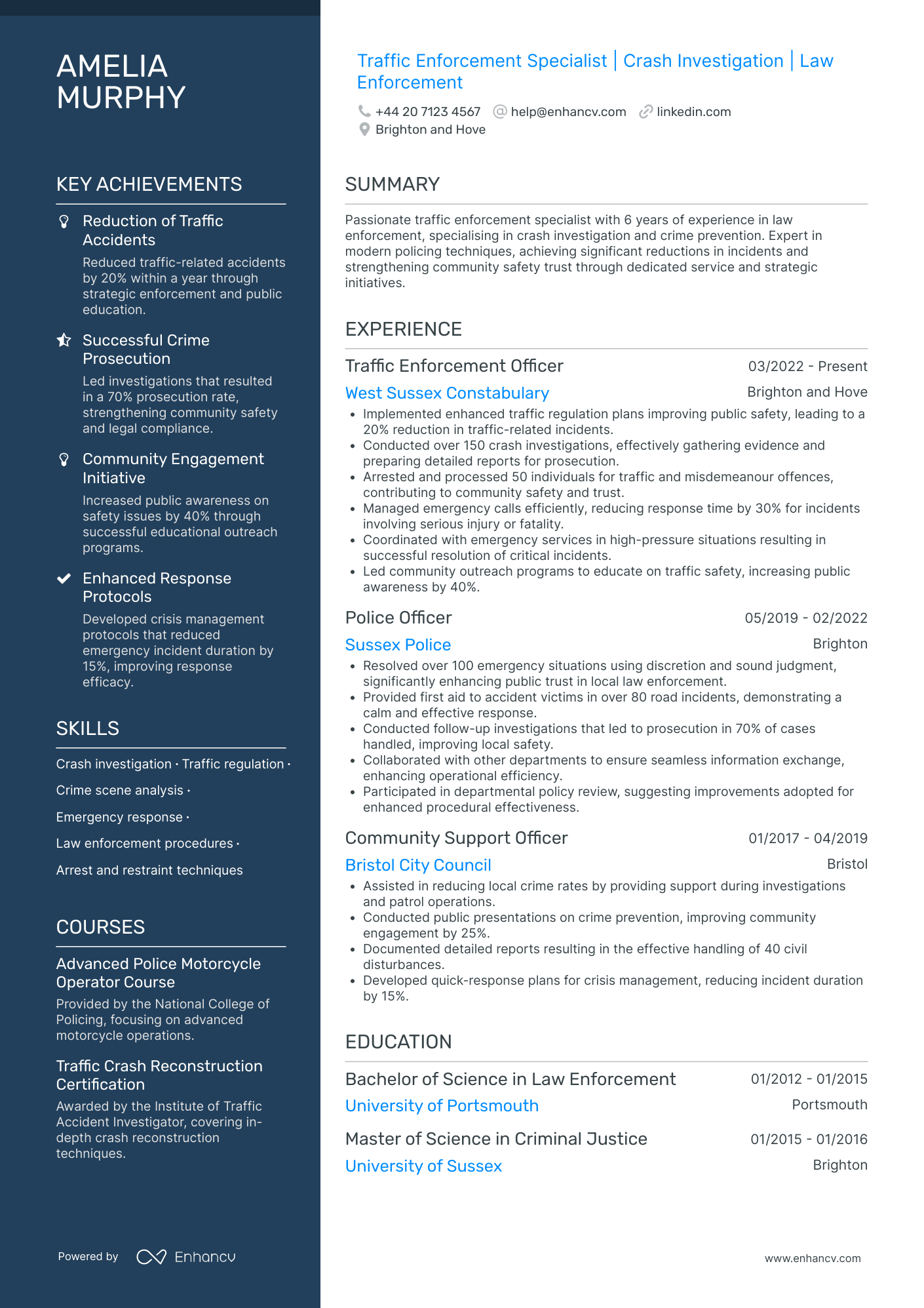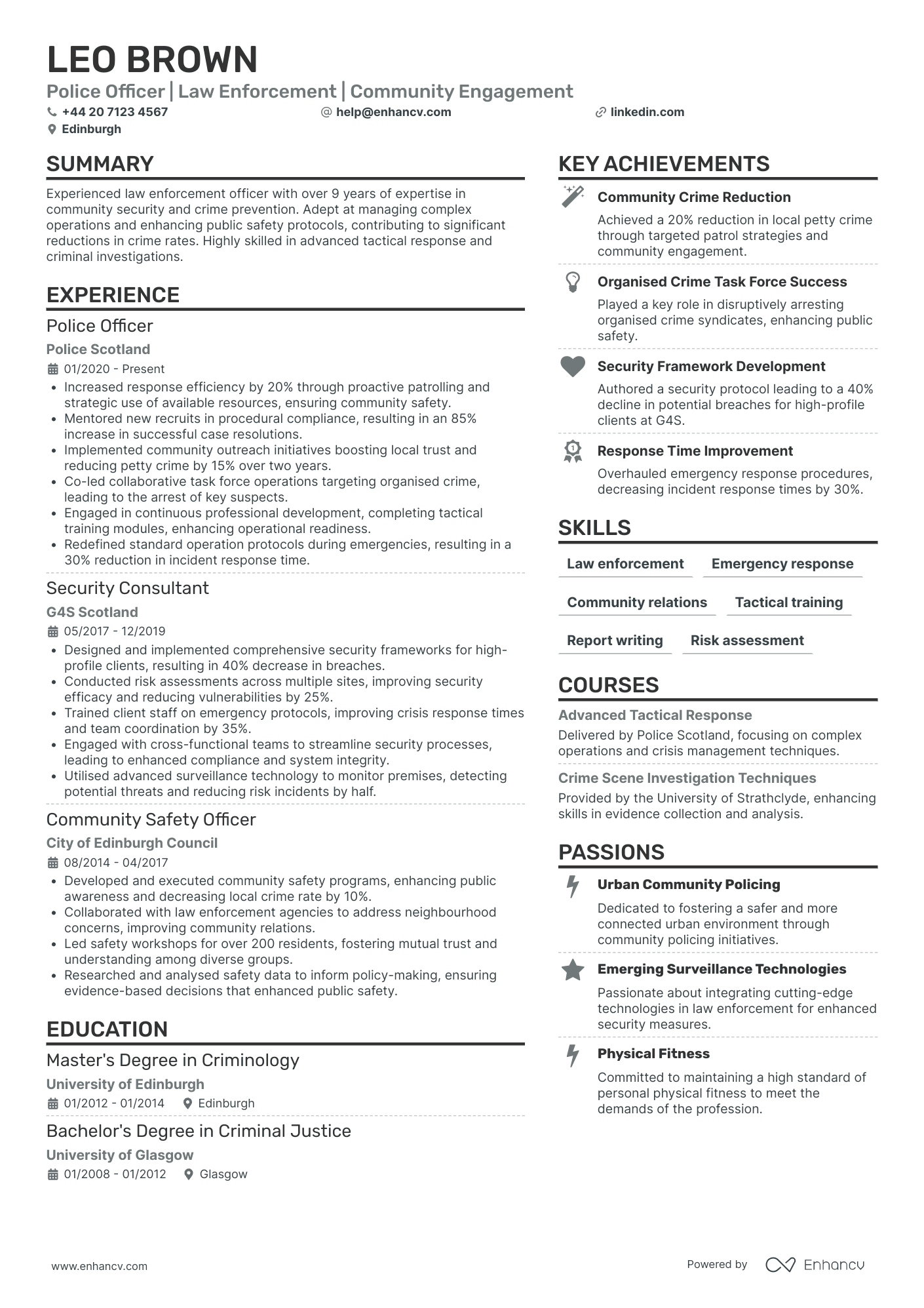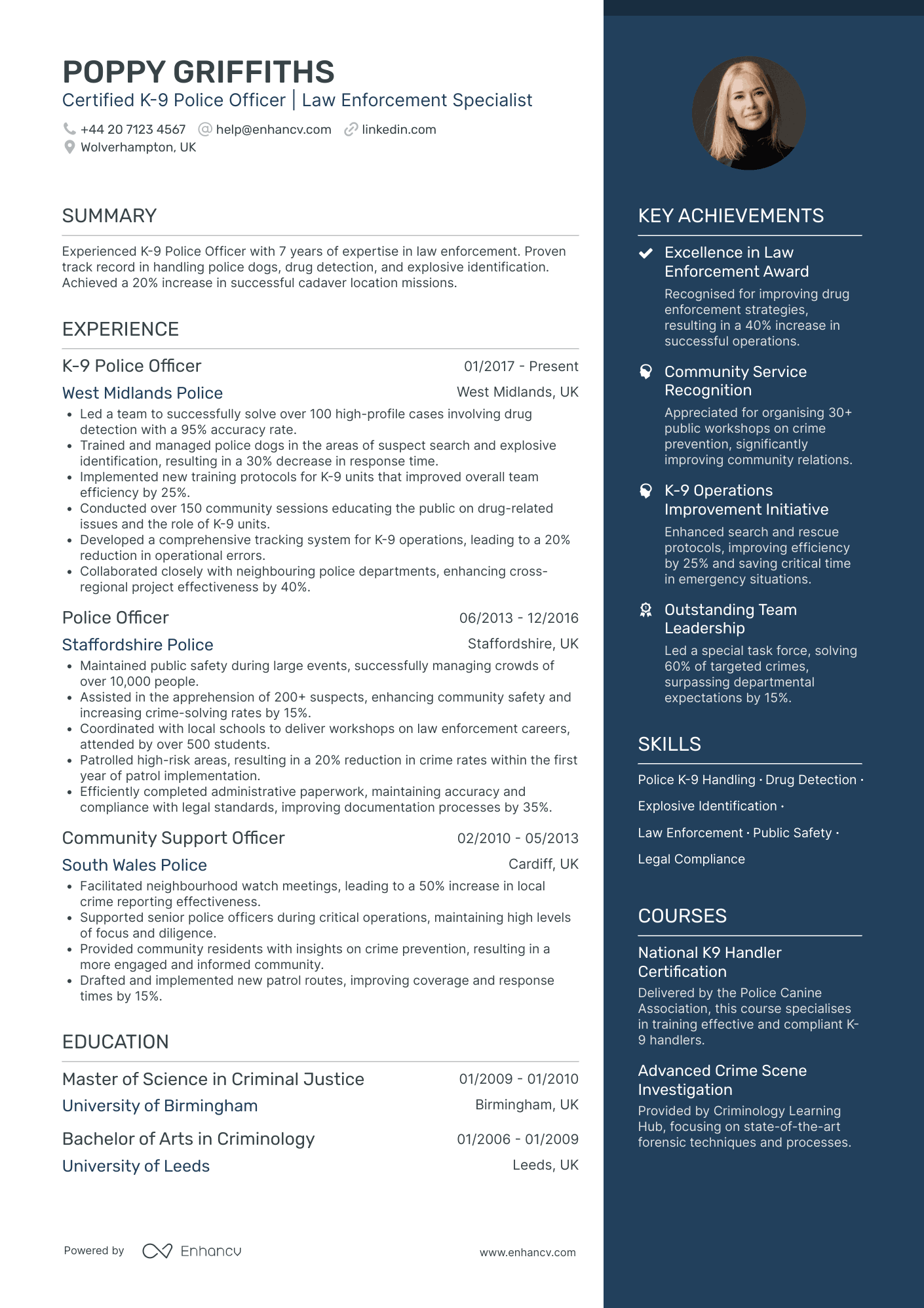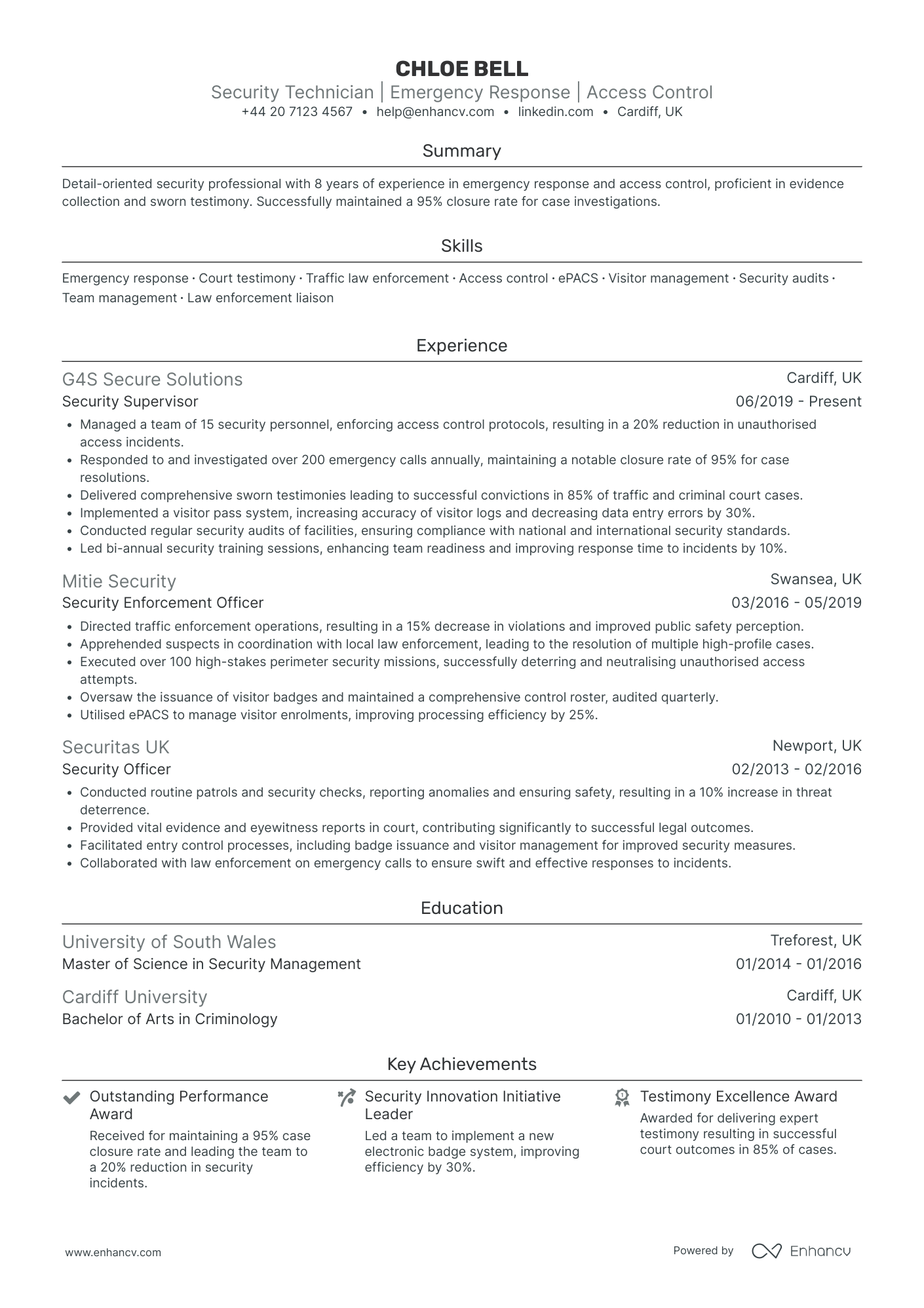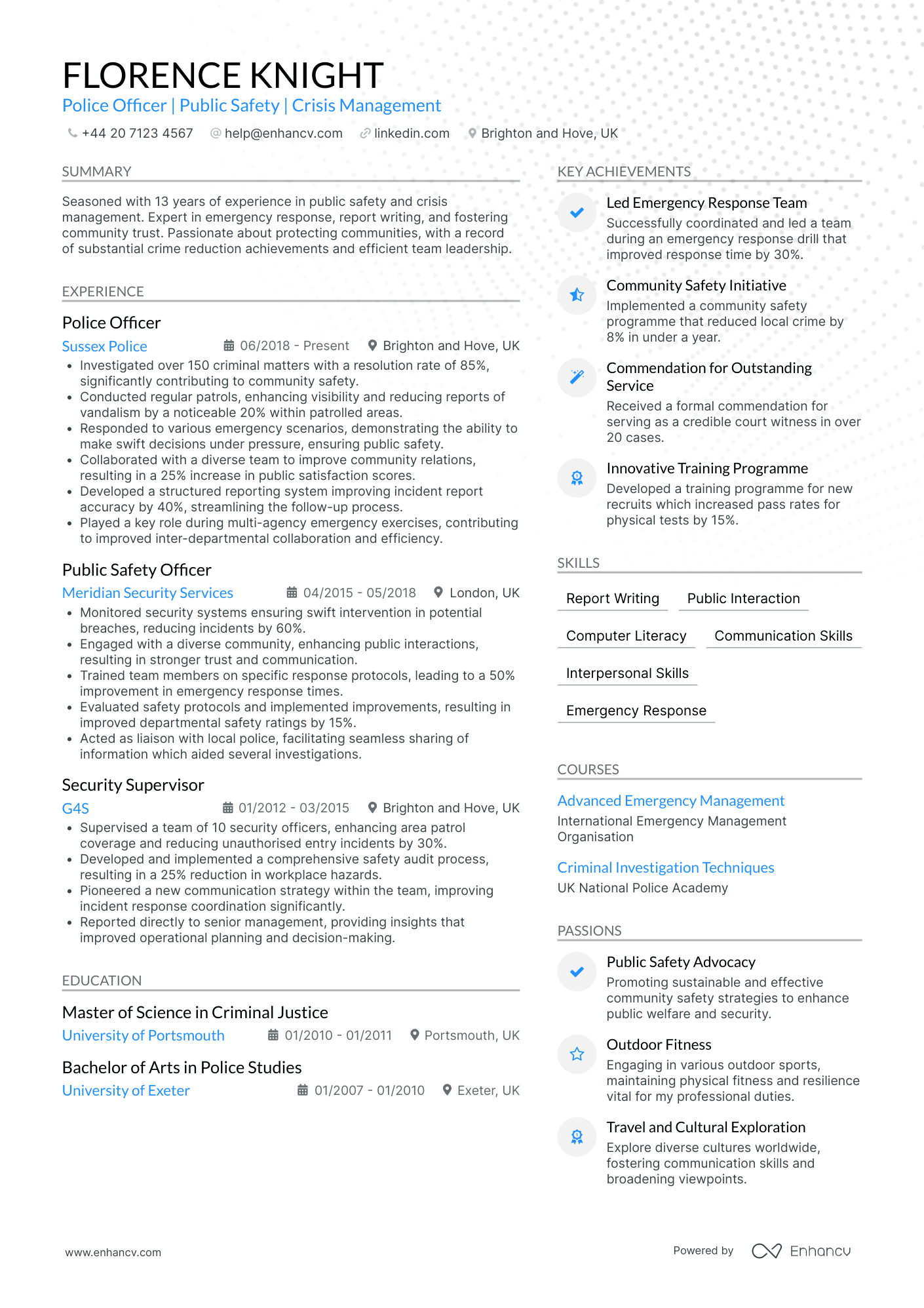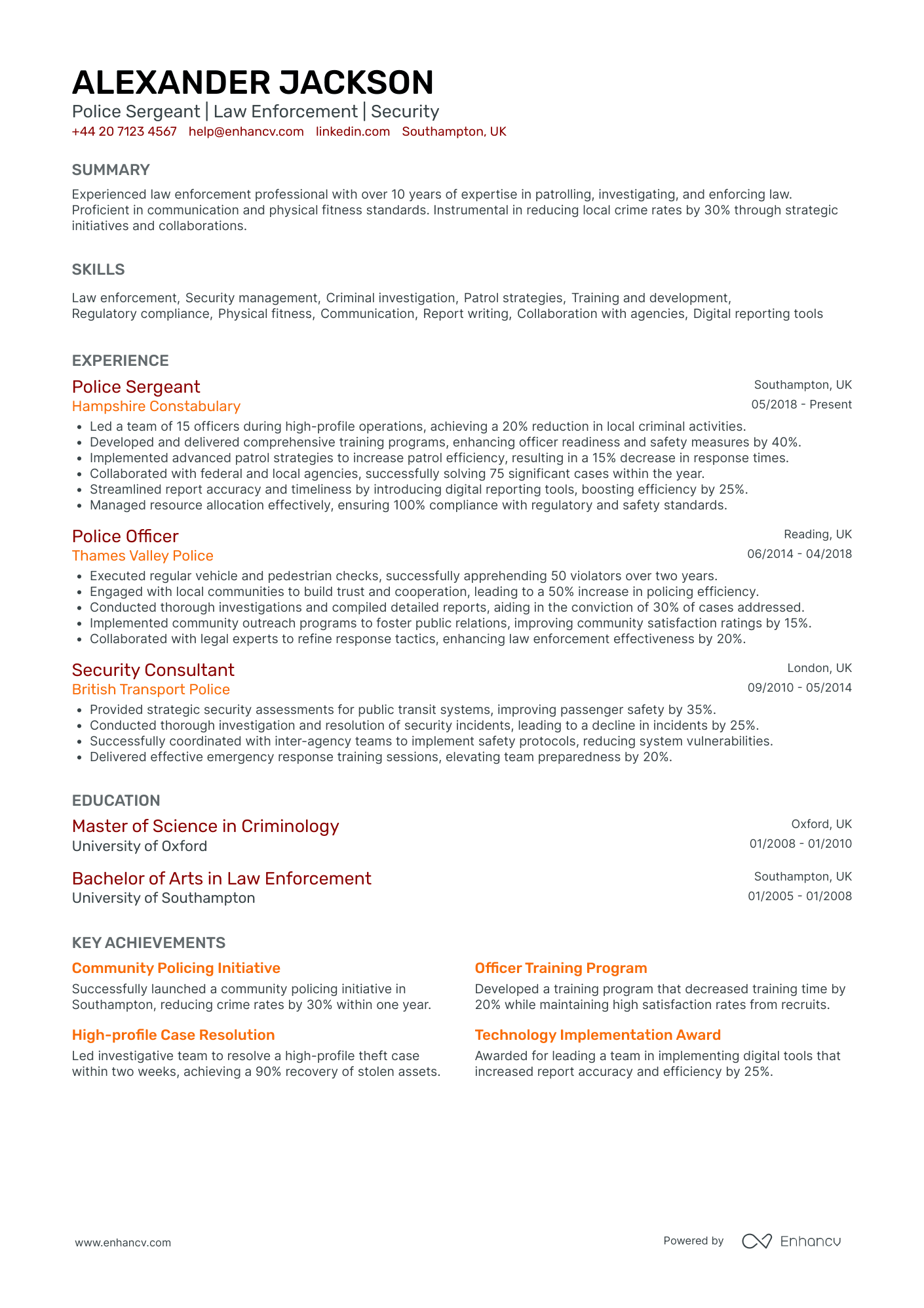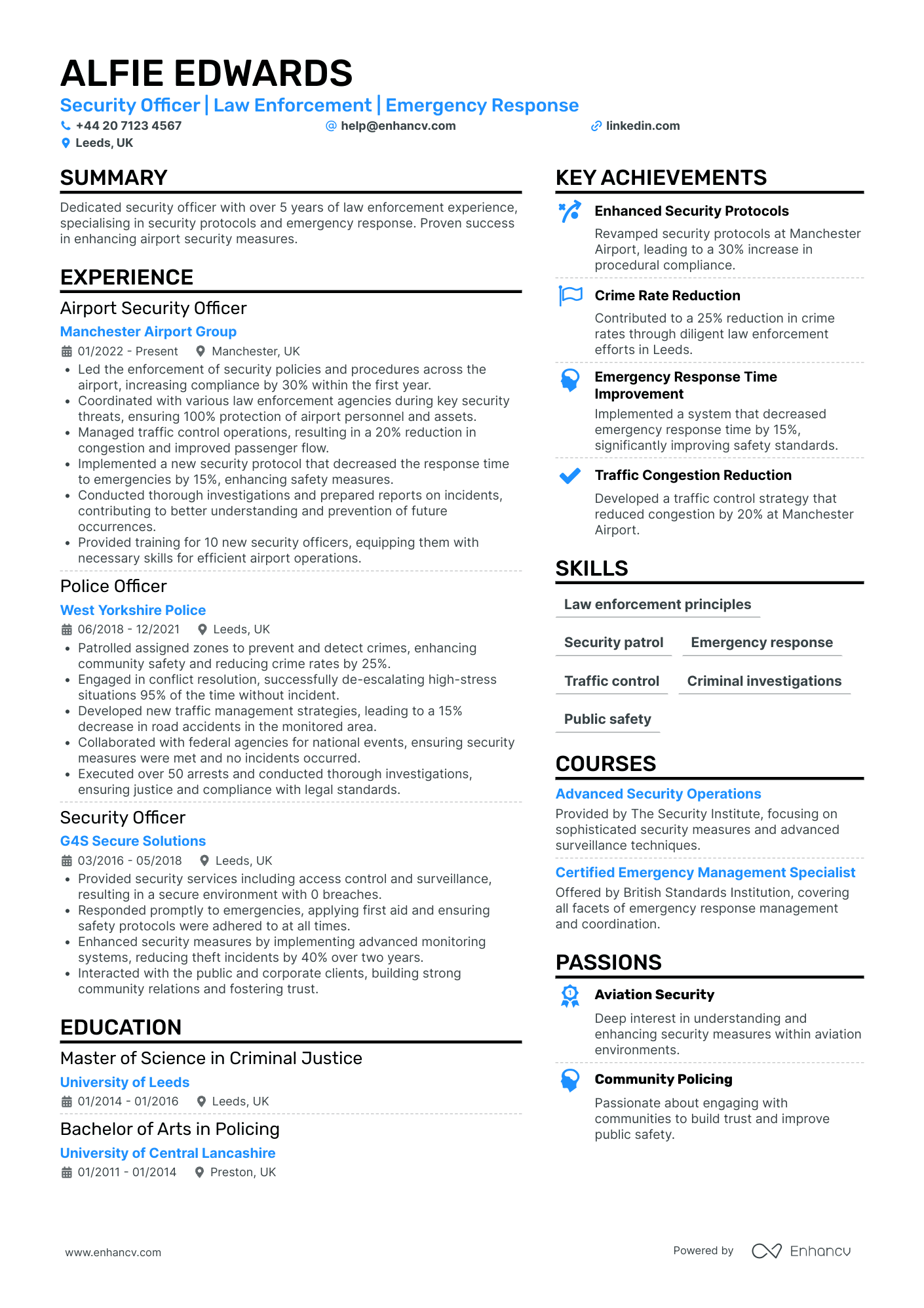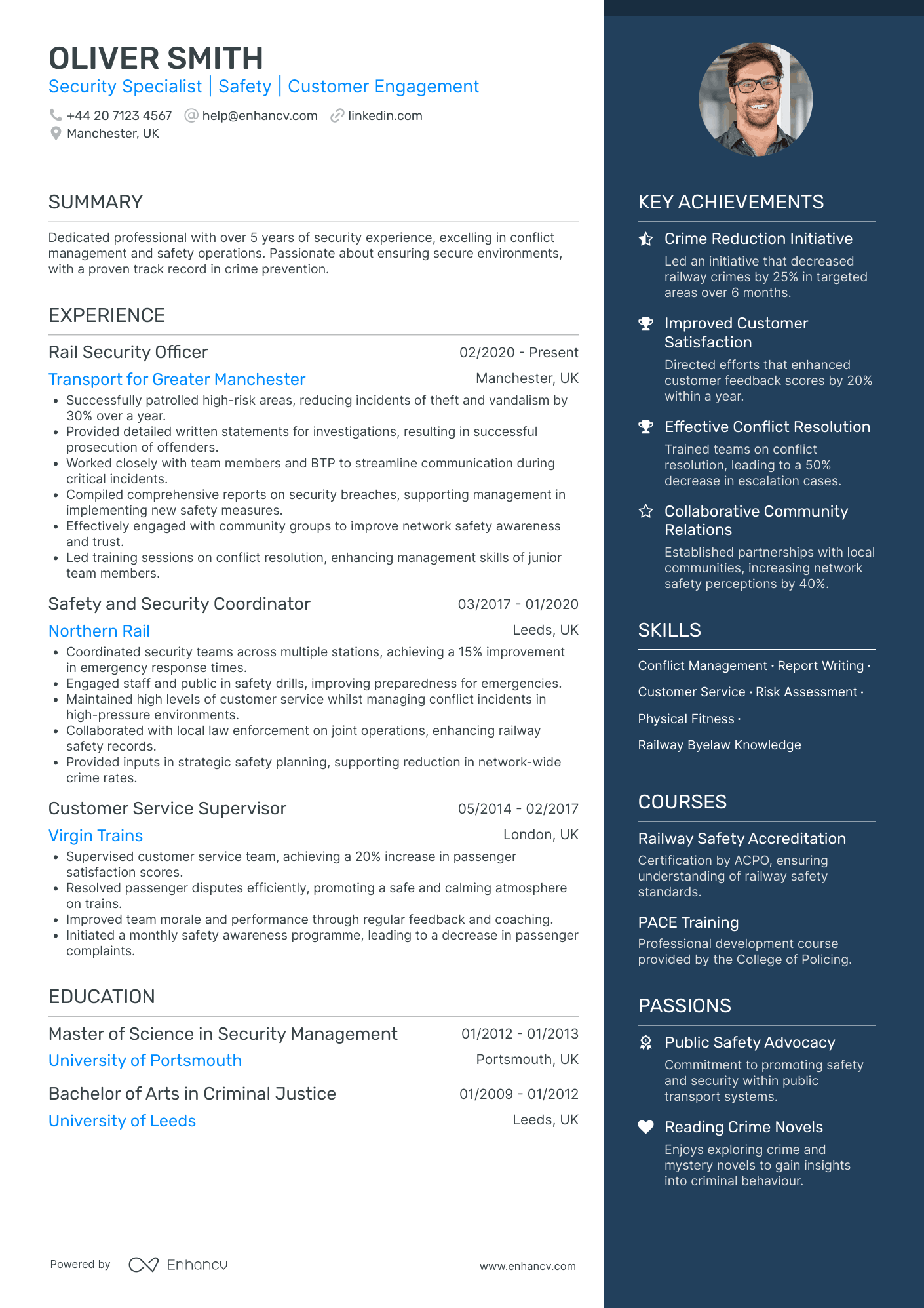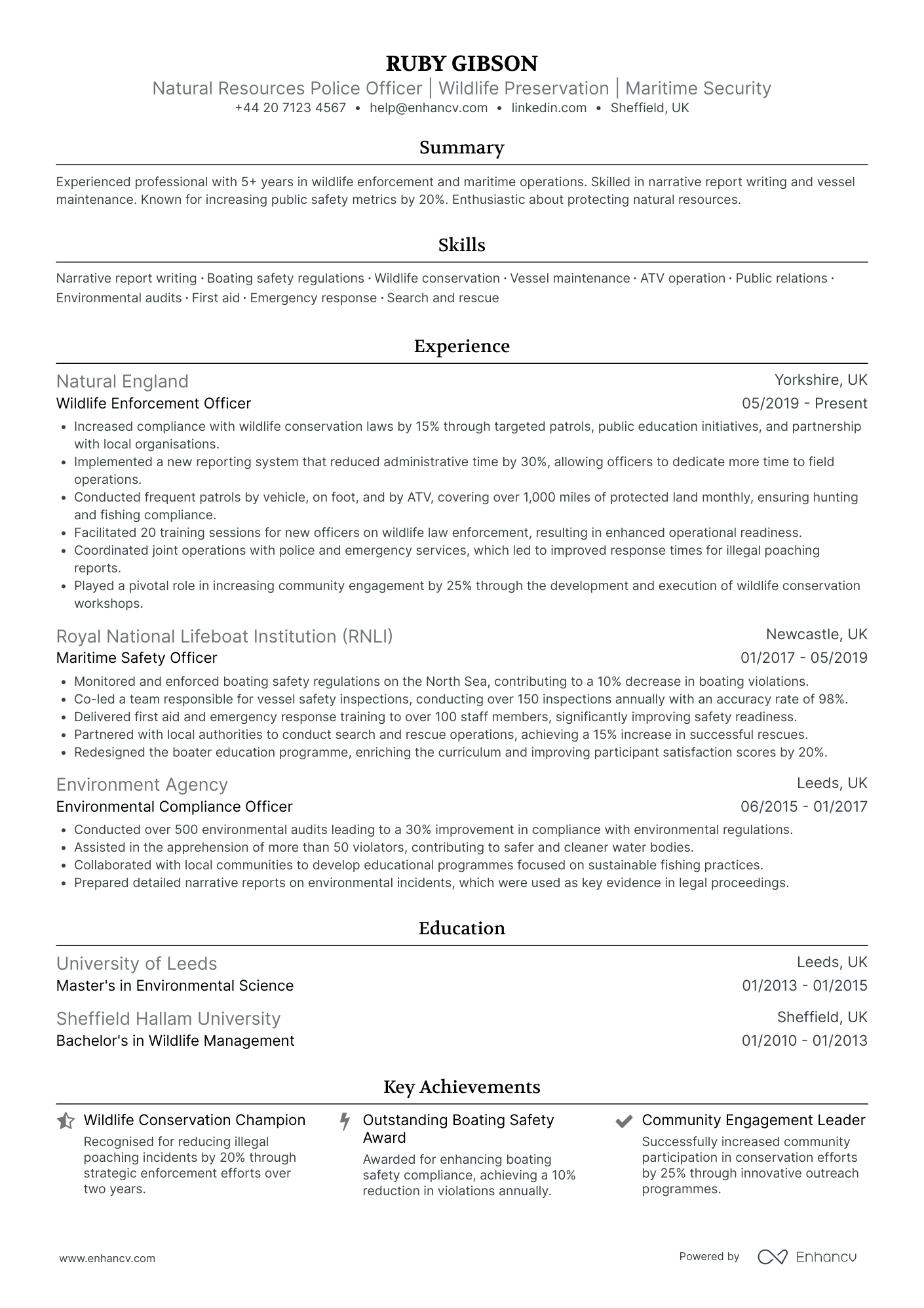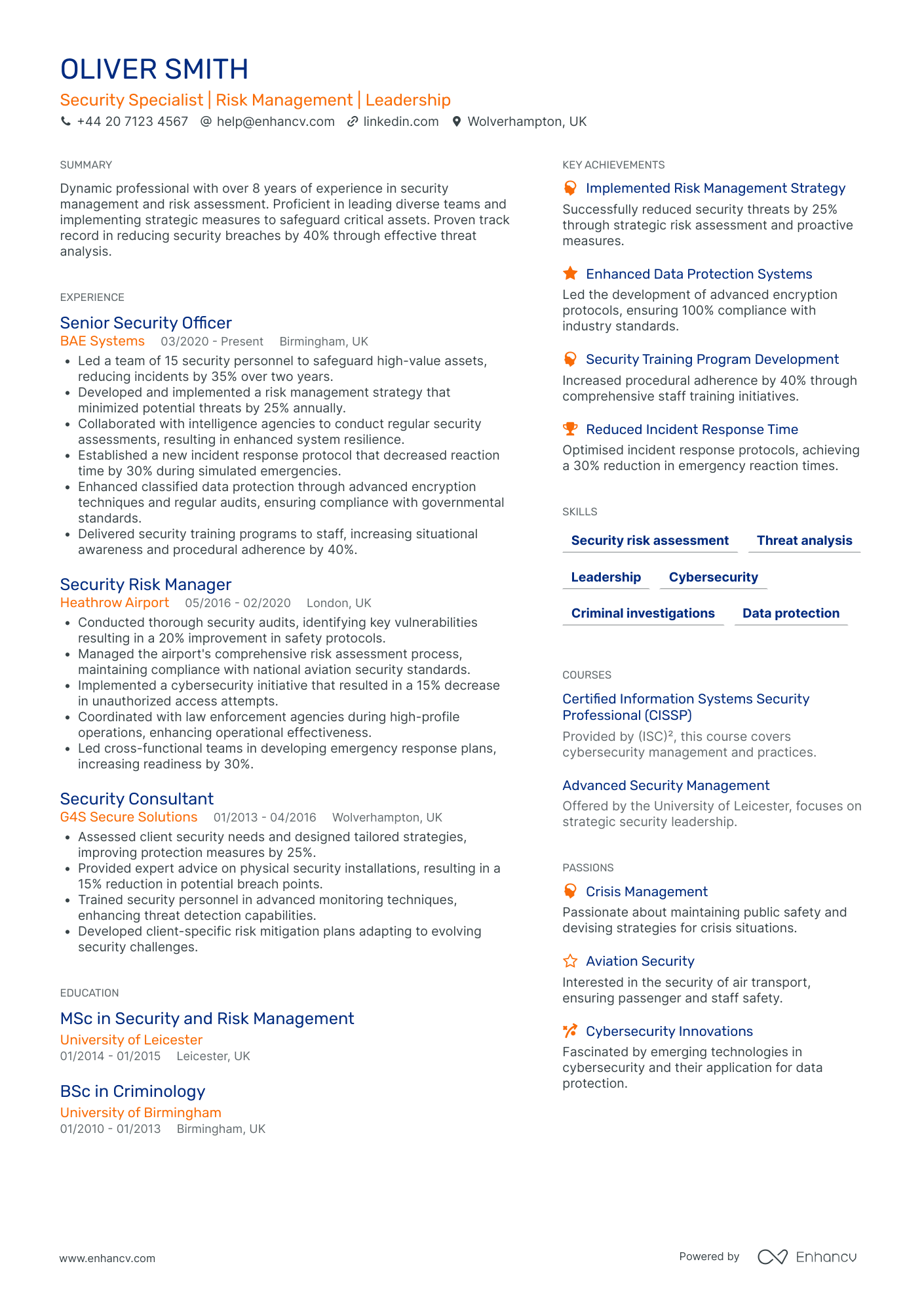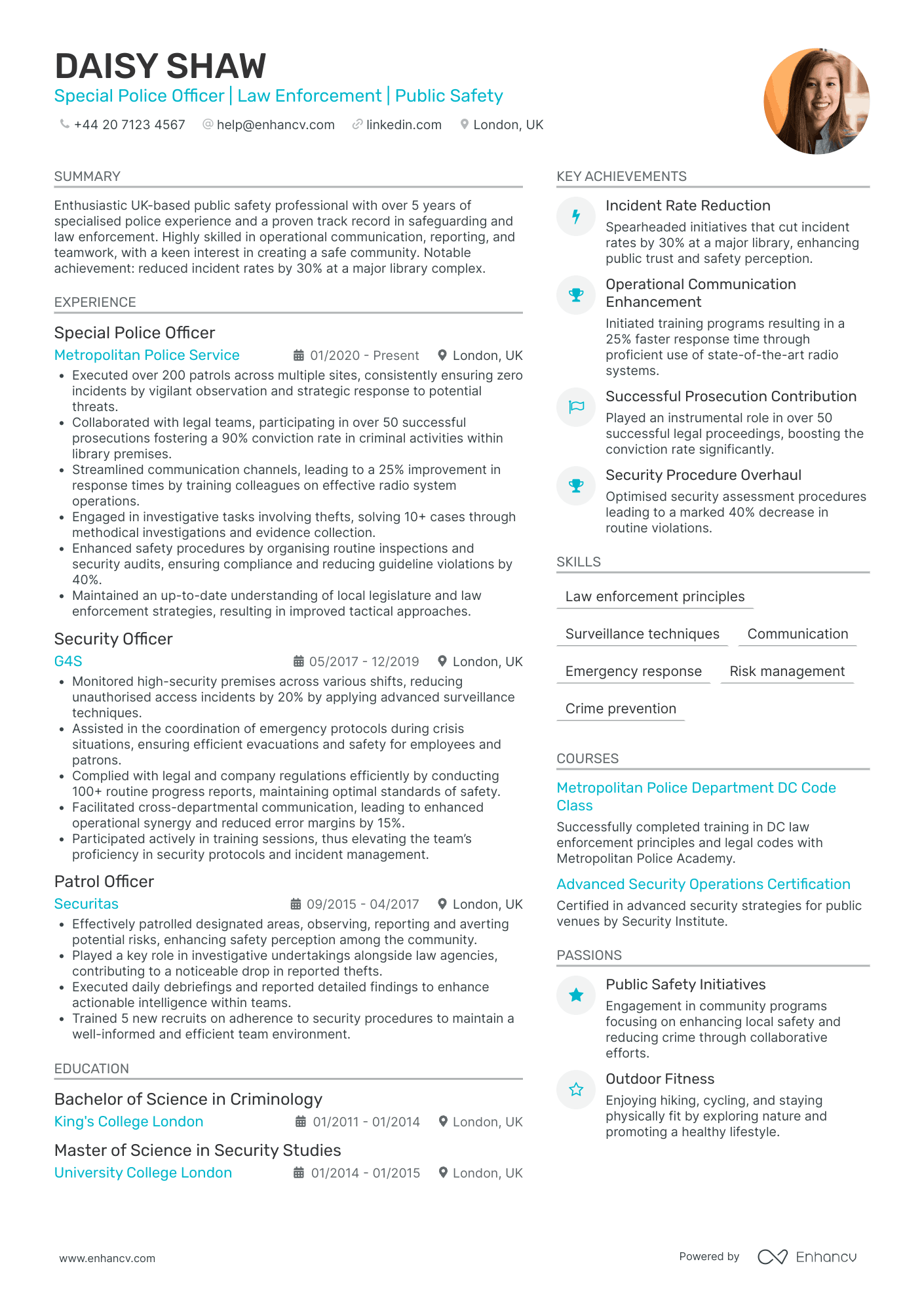One specific curriculum vitae (CV) challenge you might face as a police officer is effectively translating your diverse and dynamic range of skills into civilian terms. Our guide offers comprehensive strategies to articulate your law enforcement expertise in a way that resonates with non-police employers, ensuring your application stands out.
- Answer job requirements with your police officer CV and experience;
- Curate your academic background and certificates, following industry-leading CV examples;
- Select from +10 niche skills to match the ideal candidate profile
- Write a more succinct experience section that consists of all the right details.
Do you need more specific insights into writing your police officer CV? Our guides focus on unique insights for each individual role:
CV examples for police officer
By Experience
Probationary Police Officer
- Emphasizes a trajectory of progressive responsibility and specialization - The career history showcases a clear progression from a Security Officer to a Police Officer, demonstrating growth in the law enforcement field. The transitions highlight increasing responsibilities and specializations, such as advancing from general security protocols to complex police tasks involving community-focused initiatives and crime prevention strategies.
- Effectively communicates achievements with relevant impact and scope - The proposed improvements are consistently backed by specific impacts on community safety and operational efficiency, such as a 40% reduction in local crime rates and a 35% decrease in road traffic incidents. These figures are not mere statistics but underscore a sustained positive impact on public safety, showcasing the candidate's role in fostering safer environments.
- Highlights critical skills in law enforcement with industry-specific training - The CV details key competencies such as forensic techniques and effective crime scene investigation, supported by advanced courses from reputed institutions. This focus on technical depth not only reinforces the candidate's expertise in gathering and analyzing evidence but also demonstrates an ongoing commitment to advancing skills relevant to modern policing demands.
Senior Police Officer
- Clear and Structured Presentation - The CV presents a clear and concise structure, starting with a compelling summary followed by well-organized sections that logically progress through experience, skills, education, and achievements. This organization aids in quickly communicating essential information, ensuring that the reader can easily comprehend the career narrative.
- Professional Growth and Leadership - A notable aspect of Louis Wood’s career trajectory is his growth from a Community Support Officer to a Detective Sergeant. Each role emphasizes increased responsibility and leadership, highlighted by achievements such as leading a team of detectives and developing training programs for new officers, showcasing his ability to rise through the ranks based on merit and impact.
- Community Engagement and Impact - The CV details a strong emphasis on community policing and engagement, with initiatives that resulted in significant public trust improvements and crime reduction. These activities not only demonstrate soft skills such as empathy and communication but also reflect the business relevance of fostering safer communities and enhancing police-public relations.
Police Officer First Class
- Structured and Clear Presentation - The CV is neatly organized into distinct sections such as experience, education, skills, and achievements, ensuring information is easy to locate and digest. This clear layout enhances readability and allows the hiring manager to quickly absorb key details about Arthur Davies' career and qualifications.
- Impressive Career Growth and Specialization - Arthur Davies' career trajectory shows a steady progression from a Security Officer to a Security Operations Supervisor. This upward movement through the ranks, along with his concentrated expertise in security and emergency response, underscores his dedication and effectiveness in the field.
- Significant Achievements with Real-World Impact - The achievements highlighted in the CV are not only backed by numbers but also by their substantial impact on business operations. For instance, the implementation of security protocols led to a 40% reduction in incident response times, demonstrating Arthur's ability to effect change that enhances safety and operational efficiency.
Master Police Officer
- Structured Clarity and Conciseness - The CV demonstrates a clear and concise structure, showcasing Finley Robinson's credentials in a streamlined manner. The logical arrangement of sections—ranging from education to experience and achievements—ensures the reader can navigate easily and absorb key information without any confusion, highlighting Finley's police expertise effectively.
- Diverse Career Trajectory - Finley's career growth is showcased through progressive roles within law enforcement sectors, moving from an Assistant Patrol Officer to a Senior Police Officer. This advancement illustrates a dynamic career trajectory, emphasizing both skill development and leadership capabilities in the rigorous domain of policing and investigations.
- Industry-Specific Methodologies and Tools - The CV effectively highlights Finley's engagement with unique industry-specific elements such as surveillance operations, interview techniques, and the coordination of cross-agency operations. The technical depth in managing surveillance and the application of advanced interrogation methods underscore a strong command over specialized policing practices.
Chief Police Officer
- Clear Professional Structure - The CV is well-organized, starting with an informative summary that gives a high-level view, followed by a chronological progression of positions, education, skills, and additional qualifications. This structured flow provides a coherent picture of the candidate’s professional journey, making it easy for recruiters to navigate.
- Progressive Career Advancement - Theodore Green's career trajectory is marked by steady promotions from Police Sergeant to Assistant Chief of Police, reflecting significant growth and increasing responsibilities. This upward movement showcases a track record of proven leadership capabilities and consistent performance excellence in law enforcement.
- Substantial Impact on Crime Reduction - The achievements section highlights Theodore’s ability to deliver substantial business impact through initiatives such as a 20% reduction in regional crime rates and a 40% increase in community satisfaction. These underscore his effective strategic deployment and community engagement which are critical to policing impact.
By Role
Community Police Officer
- Content Presentation: Structured and Concise - The CV is meticulously structured with clearly defined sections, each elaborating on key components pertinent to the candidate's career. The use of bullet points in the experience section ensures clarity and conciseness, allowing potential employers to quickly grasp Thomas Walker's accomplishments and responsibilities.
- Career Trajectory: Consistent Growth Within Public Safety - Thomas Walker’s career progression demonstrates a steady ascendancy within the realm of public safety and policing. Transitioning from roles like Public Safety Officer to Community Engagement Officer shows a dedicated track towards enhancing community relations and public safety on a broader scale, reflecting a deep commitment to this field.
- Achievements and Impact: Meaningful Community Improvement - The CV does not merely present statistics but highlights the real-world impact of Walker's initiatives, such as a 15% reduction in vandalism and successful anti-social behavior resolutions. These accomplishments underscore his ability to foster safer, more engaged communities, which are vital contributions to his role as a Police Community Support Officer.
Transit Police Officer
- Clarity and Structured Presentation - The CV is well-structured and clear, effectively guiding the reader through Isla King's professional journey. Each section is meticulously organized, providing essential information concisely, ensuring quick understanding of her career highlights and qualifications.
- Integration of Industry-Specific Tools and Methodologies - Isla King showcases her technical expertise by mentioning specific tools and methodologies used in her roles. For instance, implementing software solutions for incident tracking demonstrates her hands-on experience with industry-relevant tools, emphasizing her technical depth in security management.
- Significant Achievements with Business Relevance - The CV highlights noteworthy achievements that emphasize Isla King’s impact on business operations. By reducing incident rates by 30% and collaborating on high-stakes cases, it not only reflects her capability but also her contribution to enhancing organizational security and effectiveness.
School Police Officer
- Structured Career Growth - The CV showcases a clear and structured career trajectory, beginning from a Security Officer role, progressing to a Police Officer, and culminating as a School Police Officer. This progression highlights an evolution of responsibilities and an in-depth focus on community safety and law enforcement, reflecting a consistent dedication to career advancement and specialization in school safety.
- Emphasis on Community Engagement and Public Safety - This CV stands out with its strong focus on community engagement and public safety initiatives. The candidate consistently engaged with the community through workshops and seminars to enhance public safety perception. Achievements such as improving public perception of school safety and executing community safety initiatives demonstrate proactive measures beyond regular duties and underscore the candidate’s dedication to enriching community relations.
- Diverse Skill Set and Training - Henry White's CV reflects a well-rounded skill set specific to law enforcement, including crisis management, emergency response, and conflict resolution. Furthermore, the inclusion of specialized courses like Advanced Law Enforcement Rapid Response Training and Crisis Negotiation Skills adds depth to the professional profile, showcasing industry-specific expertise that is crucial to a School Police Officer role.
Patrol Police Officer
- Structured Presentation and Clarity - Isla King's CV is meticulously organized, ensuring clarity and easy navigation through sections like experience, education, and skills. Each section is concise, presenting the most relevant information without unnecessary clutter, thereby allowing employers to quickly assess her qualifications and expertise.
- Vertical Growth and Increased Responsibility - The trajectory from a Security Officer at G4S to a Police Officer at West Midlands Police highlights Isla's career progression. It showcases an increasing level of responsibility and specialization in criminal investigations, community safety, and leadership in law enforcement.
- Community Engagement and Effective Communication - A standout feature is Isla's adeptness in community engagement and communication. Her initiatives in increasing trust and reporting among residents reflect her strong soft skills, as she effectively forms positive police-public relationships that are crucial in maintaining community safety and cooperation.
Traffic Police Officer
- Structured Clarity in Content Presentation - The CV is well-organized and concise, effectively presenting details in a structured manner that makes it easy for readers to follow. Sections such as experience and achievements are clearly delineated, allowing for quick comprehension and easy highlighting of key skills and impacts relevant to law enforcement and traffic safety.
- Progressive Career Trajectory in Law Enforcement - Amelia Murphy's career shows a strong and steady progression within law enforcement roles. From a Community Support Officer to a Traffic Enforcement Officer, each position reflects upward mobility and skill enhancement, demonstrating her commitment and growth in the field. It underscores her advancing responsibilities and specialization in crash investigations and traffic law enforcement.
- Impactful Achievements with Tangible Community Benefits - The CV strikingly outlines achievements with meaningful impact, such as reducing traffic-related incidents and increasing public safety awareness. By noting a 20% reduction in traffic accidents and a 40% increase in public awareness, it conveys significant contributions to community safety, thus highlighting her effectiveness in executing public safety initiatives.
Mounted Police Officer
- Structured Presentation and Clarity - The CV is organized into distinct sections such as experience, education, skills, and achievements, which provides clarity and allows for easy navigation. Each position listed under the experience section includes bullet points that concisely highlight specific responsibilities and key achievements, making it easy for recruiters to quickly grasp his accomplishments and contributions.
- Progressive Career Trajectory - Leo Brown's career shows a significant upward trajectory, starting as a Community Safety Officer and progressing to a Police Officer with leadership roles like mentoring recruits and co-leading task forces. His shift from local council engagement to national law enforcement with Police Scotland indicates both professional growth and a broadening scope of influence and responsibilities.
- Impactful Achievements with Community Focus - The CV highlights several impactful achievements such as a 20% reduction in local petty crime and a 30% reduction in incident response time through improved emergency protocols. These accomplishments not only demonstrate Leo's effectiveness in law enforcement but also reflect his commitment to enhancing community safety and trust through strategic initiatives and proactive measures.
K9 Police Officer
- Comprehensive Career Growth - Poppy Griffiths' CV demonstrates a clear and upward career trajectory in law enforcement, moving from Community Support Officer to a specialized K-9 Police Officer role. This progression highlights not just a growth in responsibilities but also a deepening specialization in policing and K-9 unit management, emphasizing professional development and dedication to the field.
- Clear Impact Through Quantifiable Achievements - The CV effectively uses specific metrics to highlight the impact of Poppy’s work. With achievements such as a 20% increase in successful cadaver location missions and a 40% improvement in cross-regional project effectiveness, Poppy's contributions are presented with clear business relevance, showcasing an ability to improve operations and outcomes within law enforcement.
- Detailed Presentation of Skills and Methodologies - The CV provides a thorough overview of Poppy’s specialized skills in K-9 handling, drug detection, and explosive identification. Her experience in implementing new training protocols and utilizing comprehensive tracking systems indicates a deep technical understanding of law enforcement methodologies, tailored to the needs of a K-9 Police Officer.
Marine Police Officer
- Content presentation showcases professionalism - Chloe's CV is neatly structured, offering a seamless flow from personal details to professional experience, education, and skills. This clarity and strategic layout effectively guide the reader through her extensive background without overwhelming them with information.
- Consistent upward career trajectory - Chloe's career path indicates consistent growth from a Security Officer role to a Security Supervisor, showcasing her ability to take on increased responsibilities and leadership roles. The industry consistency in security amplifies her commitment and specialization in the field.
- Emphasis on evidence and lawful procedures - A standout element is Chloe's emphasis on the lawful side of security, demonstrated through her expertise in evidence collection and sworn testimony. This highlights her deep understanding of legal processes and her ability to contribute significantly to successful legal outcomes.
Bicycle Police Officer
- Comprehensive and Well-Structured Content Presentation - The CV is meticulously organized to convey information clearly and concisely, beginning with the personal header, followed by achievements, experience, education, and skills. Each section is logically placed, with bullet points used effectively to ensure key aspects of Florence’s career are easily digestible, which enhances readability and emphasizes important contributions to public safety and crisis management.
- Illustrates Strong Career Trajectory and Progression - Florence's career path reflects substantial growth, evidenced by her ascension from a Security Supervisor at G4S to a Police Officer at Sussex Police. Each role demonstrates increasing responsibility and influence, showcasing a steady progression from overseeing a small team to leading emergency responses and community initiatives, indicative of her capability and industry dedication.
- Emphasizes Adaptability and Cross-Functional Experience - The CV highlights Florence’s adaptability through her diverse roles in law enforcement and security, demonstrating her ability to engage in different facets of public safety. Her experience across various settings—from supervising security operations to facilitating public trust and safety protocols—showcases her versatility and capacity to effectively collaborate across multiple functions and departments.
Motorcycle Police Officer
- Clarity and Structure in Content Presentation - Alexander Jackson's CV is meticulously organized, presenting his qualifications in a clear hierarchy. The use of bullet points and concise language allows for quick absorption of key information, particularly important in law enforcement where clear communication is critical.
- Demonstrates Advanced Leadership and Soft Skills - The CV effectively highlights Jackson’s leadership capabilities, notably his ability to lead teams in high-pressure environments. It underscores his proficiency in training and team development, crucial for maintaining an effective and responsive law enforcement unit.
- Business-Relevant Achievements and Impact - Rather than merely listing achievements, Jackson's CV specifies the direct impact of his actions, such as a 20% reduction in crime rates and a 15% decrease in response times. This emphasis on measurable outcomes showcases the concrete benefits he brings to the community's safety.
Airport Police Officer
- Structured and Clear Presentation - The CV is well-organized, making information easy to locate and understand. Sections are clearly labeled, and bullet points are used effectively to convey achievements and responsibilities concisely. This structure aids in presenting a comprehensive view of the candidate's experience and skills without overwhelming the reader.
- Strong Career Progression and Diverse Experience - Alfie Edwards showcases a thoughtful career trajectory with advancement from a general Security Officer role to specialized positions in broader law enforcement and high-stakes environments like airports. This progression highlights his adaptability and commitment to professional growth within the security and law enforcement sectors.
- Impactful Achievements with Clear Relevance - The CV emphasizes business relevance by illustrating the candidate's contributions through achievements with quantifiable outcomes. For instance, the implementation of a system that improved emergency response times by 15% and reduced congestion by 20% at Manchester Airport shows a direct impact on operational efficiency, demonstrating not just capability but also a tangible contribution to organizational goals.
Railway Police Officer
- Clarity and structured presentation - The CV is meticulously structured, presenting information in a clear and concise manner. Each section is neatly organized, ensuring that the reader can quickly glean key information without sifting through irrelevant details. The use of bullet points under each job role allows for quick consumption of main tasks and achievements.
- Evidence of career growth and industry engagement - Oliver's career progression from a Customer Service Supervisor to a specialized role as a Security Specialist reflects a clear trajectory of growth and expertise in the security domain. His ability to transition effectively through roles within different rail companies showcases a strong alignment with industry demands and progressive responsibility.
- Impact-driven achievements with business relevance - The CV highlights Oliver’s significant contributions through impactful achievements. For instance, initiating security projects that reduced crime rates and improved customer satisfaction showcases his ability to deliver results that directly benefit business operations, improving safety standards and customer relationships in measurable ways.
Wildlife Police Officer
- Cohesive and Structured Presentation - Ruby Gibson's CV excels in presenting well-organized information with a consistent format, making it easy for hiring managers to navigate through the detailed sections. Bullet points efficiently convey key responsibilities and achievements, maintaining clarity and conciseness throughout the document.
- Progressive Career Path in Environmental and Maritime Safety - Ruby's career trajectory showcases significant growth from an Environmental Compliance Officer to a Natural Resources Police Officer. This progression reflects a strong commitment to advancing within the field, with increasingly complex roles in wildlife regulation and maritime safety oversight.
- Specialized Use of Technical Methodologies - The CV highlights Ruby's proficiency in using unique industry-specific methodologies, such as conducting environmental audits, developing compliance systems, and implementing advanced boating safety measures. These skills underscore their technical competence and ability to adapt to specialized aspects of natural resource and maritime management.
Military Police Officer
- Structured Presentation of Core Competencies - The CV's presentation is clear and concise, with a well-organized format that allows easy navigation through sections such as experience, education, and skills. Each section is structured to highlight key strengths and accomplishments, ensuring that Oliver's expertise in security management is evident at first glance.
- Demonstrates Progressive Career Growth - Oliver's career trajectory showcases a clear path of growth and increasing responsibility within the security industry. His progression from Security Consultant to Senior Security Officer reflects his dedication to enhancing his skills and leadership qualities, as well as his ability to adapt and thrive in different security environments.
- Measurable Achievements with Industry Impact - The CV stands out due to its focus on quantifiable achievements that underline Oliver's impact on the organizations he worked with. The mention of reductions in security breaches, improved readiness, and significant training program enhancements illustrate a strong ability to contribute to organizational security and resilience, providing assurance of his capability to drive positive change.
Special Branch Police Officer
- Creates a compelling narrative through career progression - The CV demonstrates Daisy Shaw's advancement from a Patrol Officer to a Special Police Officer, showing a clear trajectory in law enforcement. This growth highlights her increasing responsibilities and her ability to adapt to more complex roles within the same industry.
- Presents impactful and relevant achievements - The CV effectively quantifies Daisy's contributions, such as a 30% reduction in incident rates at a library complex and a 25% improvement in response times. These achievements underline her ability to bring about tangible improvements in safety and operational efficiency, which are crucial in law enforcement.
- Showcases a blend of hard and soft skills - Daisy's CV lists key law enforcement skills such as surveillance techniques and emergency response, alongside essential soft skills like communication and teamwork. Her ability to blend technical prowess with interpersonal effectiveness is particularly appealing in roles that require collaboration with diverse stakeholders.
How complex should the format of your police officer CV be?
Perhaps, you decided to use a fancy font and plenty of colours to ensure your police officer CV stands out amongst the pile of other candidate profiles. Alas - this may confuse recruiters. By keeping your format simple and organising your information coherently, you'll ultimately make a better impression. What matters most is your experience, while your CV format should act as complementary thing by:
- Presenting the information in a reverse chronological order with the most recent of your jobs first. This is done so that your career history stays organised and is aligned to the role;
- Making it easy for recruiters to get in touch with you by including your contact details in the CV header. Regarding the design of your CV header, include plenty of white space and icons to draw attention to your information. If you're applying for roles in the UK, don't include a photo, as this is considered a bad practice;
- Organising your most important CV sections with consistent colours, plenty of white space, and appropriate margins (2.54 cm). Remember that your CV design should always aim at legibility and to spotlight your key information;
- Writing no more than two pages of your relevant experience. For candidates who are just starting out in the field, we recommend to have an one-page CV.
One more thing about your CV format - you may be worried if your double column CV is Applicant Tracker System (ATS) complaint. In our recent study, we discovered that both single and double-column CVs are ATS-friendly . Most ATSes out there can also read all serif and sans serif fonts. We suggest you go with modern, yet simple, fonts (e.g. Rubik, Lato, Raleway) instead of the classic Times New Roman. You'll want your application to stand out, and many candidates still go for the classics. Finally, you'll have to export your CV. If you're wondering if you should select Doc or PDF, we always advise going with PDF. Your CV in PDF will stay intact and opens easily on every OS, including Mac OS.

PRO TIP
For certain fields, consider including infographics or visual elements to represent skills or achievements, but ensure they are simple, professional, and enhance rather than clutter the information.

The top sections on a police officer CV
- Relevant Policing Experience to showcase past law enforcement roles.
- Law Enforcement Certifications to highlight specialised training and qualifications.
- Key Law Enforcement Skills to demonstrate abilities unique to police work.
- Awards & Commendations to reflect recognised performance and achievements.
- Community Policing Initiatives to show engagement with community relations.

What recruiters value on your CV:
- Highlight your understanding of local laws and regulations, as a comprehensive knowledge of legal frameworks is critical for a police officer.
- Emphasise any experience in community engagement or working with the public, as this demonstrates your ability to communicate effectively and build trust within the community.
- Detail relevant training or qualifications, such as self-defence, first aid, or crisis intervention techniques, which are directly applicable to the day-to-day responsibilities of a police officer.
- Include any instances of problem-solving or critical thinking in high-pressure situations, as these skills are highly valued in policing and law enforcement roles.
- Point out your physical fitness levels and any athletic achievements, since the role of a police officer often requires a good level of physical ability to respond to emergencies.
Recommended reads:
How to present your contact details and job keywords in your police officer CV header
Located at the top of your police officer CV, the header presents recruiters with your key personal information, headline, and professional photo. When creating your CV header, include your:
- Contact details - avoid listing your work email or telephone number and, also, email addresses that sound unprofessional (e.g. koolKittyCat$3@gmail.com is definitely a big no);
- Headline - it should be relevant, concise, and specific to the role you're applying for, integrating keywords and action verbs;
- Photo - instead of including a photograph from your family reunion, select one that shows you in a more professional light. It's also good to note that in some countries (e.g. the UK and US), it's best to avoid photos on your CV as they may serve as bias.
What do other industry professionals include in their CV header? Make sure to check out the next bit of your guide to see real-life examples:

Examples of good CV headlines for police officer:
- Police Constable | Community Relations Specialist | Public Safety Expert | 5 Years Service
- Sergeant | Crime Prevention Coordinator | Leadership Training Certificate | 8+ Years on the Beat
- Detective Inspector | Homicide Investigations Pro | Forensic Analysis Enthusiast | Over 10 Years Experience
- Chief Superintendent | Strategic Operations Leader | Counter-Terrorism Experience | 15+ Years Dedication
- Police Dog Handler | K9 Training Expert | Drugs and Explosives Detection | 7 Years in Service
- Traffic Officer | Road Safety Advocate | Accident Investigation Specialist | Advanced Driving Certificate | 6 Years Patrol Experience
What's the difference between a police officer CV summary and objective
Why should it matter to you?
- Your police officer CV summary is a showcasing your career ambitions and your unique value. Use the objective to answer why your potential employers should hire you based on goals and ambitions. The objective is the ideal choice for candidates who happen to have less professional experience, but still meet some of the job requirements.
Before you select which one will be more relevant to your experience, have a look at some industry-leading CV summaries and objectives.

CV summaries for a police officer job:
- Seasoned police officer with over 10 years of experience in urban law enforcement, adept in conflict resolution, criminal investigations, and community policing. Recipient of the Chief’s Commendation Award for courage and leadership during an emergency crisis.
- Dedicated former military sergeant with 8 years of experience, seeking to transfer skills in strategic planning, team coordination, and risk assessment to a career in law enforcement. Excelled in high-pressure environments and recognized for outstanding leadership abilities.
- Committed educator with 15 years of experience in teaching and administration, eager to apply strong communication skills, crisis intervention techniques, and problem-solving abilities to a new career in policing.
- Enthusiastic about joining the metropolitan police force as a recent criminology graduate with academic honours; eager to apply theoretical knowledge, strong analytical skills, and a fresh perspective to contemporary policing challenges.
- Seeking an entry-level policer officer position where my strong sense of justice and commitment to societal welfare can contribute to effective crime prevention and community relations, while I develop hands-on experience in law enforcement.
- Aspiring to utilise my bachelor's degree in psychology and passion for public service by starting a policing career, where my understanding of human behaviour and excellent interpersonal skills can aid in sensitive investigations and foster community trust.
More detailed look into your work history: best advice on writing your police officer CV experience section
The CV experience is a space not just to merely list your past roles and responsibilities. It is the CV real estate within which you could detail your greatest accomplishments and skills, while matching the job requirements. Here's what to have in your experience section:
- Prove you have what the job wants with your unique skill set and past successes;
- Start each bullet with a strong, action verb, and continue with the outcome of your responsibility;
- Use any awards, nominations, and recognitions you've received as solid proof of your skill set and expertise;
- align your experience with the role responsibilities and duties.
For more help on how to write your CV experience section, check out the next section of our guide:

Best practices for your CV's work experience section
- Demonstrated ability to maintain public safety and enforce laws firmly and fairly. Managed high-stress situations professionally and defused conflicts through effective communication and negotiation techniques.
- Conducted regular patrols in assigned areas to deter and detect criminal activity. Compiled detailed reports and provided witness statements that contributed to successful prosecution and convictions.
- Expertly operated police equipment, including patrol vehicles, radios, and computer systems, ensuring constant readiness and effective response to incidents. Maintained equipment in top condition through regular inspections and servicing.
- Engaged with local communities to build trust and improve police visibility. Organised public meetings to address safety concerns and gather intelligence which informed policing strategies.
- Trained in advanced first aid and rapid response, efficiently administering life-saving procedures on multiple occasions. Successfully managed emergency scenes until the arrival of medical professionals.
- Experienced in conducting thorough investigations, gathering evidence, and interviewing witnesses and suspects. Applied exceptional attention to detail to ensure no critical information was overlooked.
- Implemented crime prevention initiatives that led to a noticeable reduction in petty crime rates in my patrol area. Collaborated with neighbourhood watch programs and provided security assessments for residents.
- Effectively managed incident scenes, establishing cordons and liaising with other emergency services. Facilitated smooth inter-agency operations during large-scale emergencies and public events.
- Detailed familiarity with legal procedures and protocols, ensuring that all arrests and evidence collection adhered to legal requirements. Successfully navigated complex legal environments to support the criminal justice process.
- Played a pivotal role in reducing crime rates by 20% through strategic patrolling and community engagement initiatives.
- Led a high-profile burglary investigation, supervising a team of 5, which culminated in the successful prosecution of a serial offender.
- Collaborated with local businesses to establish a neighbourhood watch programme, improving surveillance and security awareness.
- Implemented an innovative traffic management system which decreased vehicular accidents in the area by 25%.
- Recognised with an award for outstanding public service after diffusing a potentially violent street confrontation without casualties.
- Conducted regular workshops on personal safety and crime prevention for schools and elderly residents, benefiting over 2,000 individuals.
- Expertly managed a team of 8 officers, consistently meeting departmental KPIs while maintaining high morale.
- Initiated a 'Cycle Safe' campaign that resulted in a 30% drop in bike thefts within the community.
- Spearheaded a joint task force with the Drug Enforcement Department, leading to a significant disruption of local narcotics distribution networks.
- Coordinated with local educators to implement a drug awareness curriculum, reducing underage substance abuse cases by 15%.
- Maintained an incident response time of under 4 minutes, demonstrating a strong commitment to community safety and emergency readiness.
- Facilitated inter-departmental communication, leading to the development of a unified crime database improving the resolution of cases by 10%.
- Developed a specialised training programme on cybercrime detection for fellow officers, significantly enhancing the police force's digital capabilities.
- Acted as a liaison with the Crown Prosecution Service, producing detailed and precise reports that increased conviction rates by 18%.
- Coordinated with international law enforcement agencies in a multi-national fraud case, reclaiming fraudulent transactions totalling £500,000.
- Oversaw the implementation of body-worn video technology across the force, promoting transparency and resulting in a 35% reduction in public complaints.
- Managed critical incident scenes, ensuring the safety of both civilians and officers while preserving vital evidence for investigation purposes.
- Pioneered a community policing initiative that fostered trust and cooperation between the police and a historically marginalised neighbourhood.
- Efficiently administered a public safety event for 50,000 attendees, strategically deploying resources to maintain order and prevent incidents.
- Provided expert testimony in court cases, which was crucial in securing the conviction of high-profile criminal cases.
- Leveraged advanced forensic training to process crime scenes, which increased the evidential yield by 40%.
- Implemented a department-wide fitness regimen that improved the physical performance standards of the force by 20%.
- Charged with the safety and coordination of VIP protection details during state visits and high-profile events.
- Initiated youth engagement programs focusing on legal education, which fostered mutual respect and reduced juvenile delinquency rates.
Lacking professional expertise: how to write your CV to highlight your best talents
Don't count on your lucky stars when you're applying for a role, where you happen to have less (or almost none) professional experience. Recruiters sometimes do hire inexperienced candidates if they're able to present their unique value from the get-go. So, instead of opting for the traditional, CV experience section:
- List any applicable expertise you happen to have - no matter if it's a part-time job, internship, or volunteer work. This would hint to recruiters that your profile is relevant;
- Focus your CV on your transferrable skills or talents you've obtained thanks to your whole life and work experience. In effect, you'll be spotlighting your value as a candidate;
- Separate more space for your applicable academic background and certificates to show you have the technical know-how;
- Ensure that within your objective, you've defined why you'll like the job and how you'll be the perfect match for it. Always ensure you've tailored your CV to individual applications.
Looking for more good examples for your first job? We'll show you how other candidates, with less professional experience, have created their job-winning CVs.
Recommended reads:

PRO TIP
Talk about any positive changes you helped bring about in your previous jobs, like improving a process or helping increase efficiency.
Describing your unique skill set using both hard skills and soft skills
Your police officer CV provides you with the perfect opportunity to spotlight your talents, and at the same time - to pass any form of assessment. Focusing on your skill set across different CV sections is the way to go, as this would provide you with an opportunity to quantify your achievements and successes. There's one common, very simple mistake, which candidates tend to make at this stage. Short on time, they tend to hurry and mess up the spelling of some of the key technologies, skills, and keywords. Copy and paste the particular skill directly from the job requirement to your CV to pass the Applicant Tracker System (ATS) assessment. Now, your CV skills are divided into:
- Technical or hard skills, describing your comfort level with technologies (software and hardware). List your aptitude by curating your certifications, on the work success in the experience section, and technical projects. Use the dedicated skills section to provide recruiters with up to twelve technologies, that match the job requirements, and you're capable of using.
- People or soft skills provide you with an excellent background to communicate, work within a team, solve problems. Don't just copy-paste that you're a "leader" or excel at "analysis". Instead, provide tangible metrics that define your success inusing the particular skill within the strengths, achievements, summary/ objective sections.
Top skills for your police officer CV:
Law Enforcement
Criminal Investigation
Crime Prevention
Firearms Handling
Self-Defence
Emergency Response
First Aid
Traffic Control
Evidence Collection
Interview and Interrogation Techniques
Communication
Problem Solving
Decision Making
Ethics and Integrity
Teamwork
Stress Management
Adaptability
Attention to Detail
Conflict Resolution
Public Relations

PRO TIP
Order your skills based on the relevance to the role you're applying for, ensuring the most pertinent skills catch the employer's attention first.
Further professional qualifications for your police officer CV: education and certificates
As you're nearing the end of your police officer CV, you may wonder what else will be relevant to the role. Recruiters are keen on understanding your academic background, as it teaches you an array of hard and soft skills. Create a dedicated education section that lists your:
- applicable higher education diplomas or ones that are at a postgraduate level;
- diploma, followed up with your higher education institution and start-graduation dates;
- extracurricular activities and honours, only if you deem that recruiters will find them impressive.
Follow a similar logic when presenting your certificates. Always select ones that will support your niche expertise and hint at what it's like to work with you. Balance both technical certification with soft skills courses to answer job requirements and company values. Wondering what the most sought out certificates are for the industry? Look no further:

PRO TIP
Use mini case studies or success stories in your CV to demonstrate how your skills have positively impacted previous roles or projects.
Recommended reads:
Key takeaways
Here are five things you need to remember about writing your police officer CV for success:
- Sort your experience based on the reverse chronological order, starting with your most recent career items, to showcase how you've grown your career;
- Include within your CV header your relevant contact details, a headline that could spotlight your unique value, and a photo - if you're applying for roles outside the UK or US;
- Decide to use the CV summary, if you happen to have more professional experience, and an objective, if you want to showcase your career goals;
- Within the experience section, write your bullets using action verbs, skills, and success, instead of just merely listing your on-the-job responsibilities;
- Prove your technical skills, using your education and certificates, and your soft skills, with your achievements and strengths sections.
